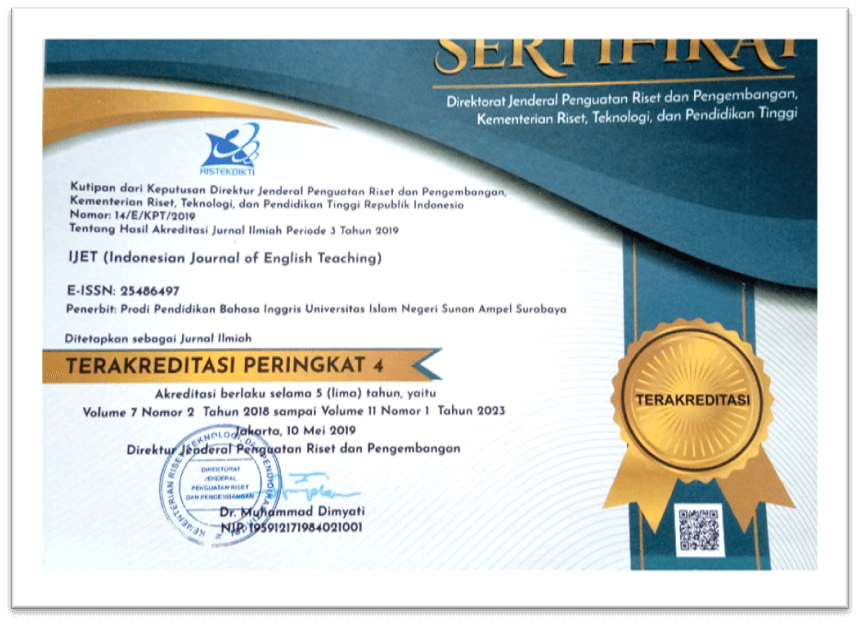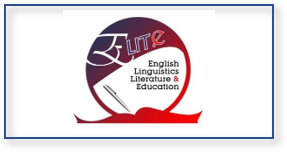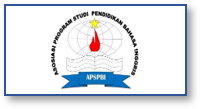Implementation of Task-based Learning in Teaching English in Indonesia: Benefits and Problems
DOI:
https://doi.org/10.15642/ijet2.2022.11.1.88-99Keywords:
task-based learning, teaching English, Indonesia, benefits, problemsAbstract
A variety of approaches exist in foreign language teaching and learning; Task-based Learning (TBL) is one of them. It is an innovative approach that is developed from the Communicative Approach. The concepts of TBL have proven successful in classrooms. In this study, the writer conducted a literature review of task-based learning in teaching English dealing with the benefits and problems in implementing this approach in Indonesia. This paper seeks to review Task-based Learning (TBL), covering the definition of 'task' and Task-based Learning (TBL), the characteristics and stages of TBL, the teacher and students' roles in Task-based Learning, and also the advantages and disadvantages of Task-based Learning. It also addresses the application, the benefits and problems of Task-based Learning in the sense of Indonesian EFL context. This will help educators and language teachers in Indonesia to attach more importance to the contextual differences when applying Task-based Learning in Indonesia.
Downloads
References
Breen, M., & Candlin, C. N. (1980). The essentials of a communicative curriculum in language teaching. Applied Linguistics, 1, 89-112.
Desmayenni, Myra. (2012). Implementation of Task-Based Learning Method in Writing Descriptive Text. Bandar Lampung: FKIP Unila.
Ellis, R. (2003). Task-based language learning and teaching. Oxford: Oxford University Press.
______. (2006). Current Issues in the Teaching of Grammar: An SLA Perspective. TESOL Quarterly. 40(1): 83-107.
______. (2009). Task-based language teaching: sorting out the misunderstandings. International Journal of Applied Linguistics, 19(3), 221-246.
Frost, R. (2004). A Task-based Approach. On line Documents at http://www.teachin-5.genglish.org.uk/think/methodology/task_based.shtml. [26.06.2020]
Harmer, Jeremy. (1998). How to Teach English: An Introduction To The Practice of English Language Teaching. England: Longman.
Hutagalung, Evi Yuniarisda. (2004). The implementation of Task-Based Language Teaching in teaching Descriptive Text to the First Graders of junior high school, 2.
Ismail, M.A. (2017). Revisiting the Implementation of Task-Based Language Teaching (TBLT) In Indonesian Secondary School: Current Issues and Possibilities. PEOPLE: International Journal of Social Sciences, 3(3), 601-612.
Jeon, I.J., and Hahn, J.W. (2006). Exploring EFL Teachers? Perceptions of Task-Based Language Teaching: A Case Study of Korean Secondary School Classroom Practice. Asian EFL Journal 8: 123 – 139.
Larsen-Freeman, D. (2000). Techniques and Principles in Language Teaching. Oxford: Oxford University Press.
Long, M., & Crookes, G. (1991). Three approaches to task-based syllabus design. TESOL Quarterly, 26(1), 27-56.
Newton, J. (2001). Options for vocabulary learning through communication tasks. ELT Journal, 55(1), 30-37.
Nunan, D. (1989). Designing Tasks for the Communicative Classroom. University of Cambridge: Cambridge University Press.
______. (2004). Task-based language teaching. Cambridge: Cambridge University Press.
Prabhu, N. S. (1987). Second Language Pedagogy. Oxford: Oxford University Press.
Richards, J. C. & Rodgers, T. S. (2001). Approaches and methods in language teaching (2nd ed.). Cambridge, UK: Cambridge University Press.
Ridder, I., Vangehuchten, L., & Gomez, M. (2007). Enhancing Automaticity through task-based language teaching. Applied Linguistics, 28 (2), 309-315.
Robinson, P. (2001). Task complexity, task difficulty, and task production: Exploring interactions in a componential framework. Applied Linguistics. 22(1), 27–57.
Samuda, V., & Bygate, M. (2008). Tasks in Second Language Learning. Basingstoke: Palgrave MacMillan.
Simamora, Ricky O. (2018). The Implementation of Task-Based Language Teaching to Improve Students’ Writing Ability at the Third Grade of SMP Widya Dharma Bandar Lampung. Skipsi. Lampung University.
Skehan, P. (1998). A cognitive approach to language learning. Oxford: Oxford University Press.
Skehan, P., and Foster, P. (1999). The influence of task structure and processing conditions on narrative retellings. Language Learning, 49/1, 93 – 120.
Swan, M. (2005). Legislation by Hypothesis: The Case of Task-Based Instruction. Applied Linguistics 26 (3), 376–401.
Willis, J. (1996). A Framework for Task-Based Learning. Harlow: Longman.
______. (2006). Research-based strategies to ignite student learning: Insights from a neurologist/classroom teacher. Alexandria, VA: ASCD.
Wisnu, Hernest. (2006). The implementation of task-based instruction in teaching speaking. Skripsi thesis. Sanata Dharma University.
Zahro, Faiqotus. (2015). The Implementation of Task-Based Learning to Improve The Tenth Grade Students' Reading Comprehension of SMA Muhammadiyah 2 Genteng in the 2014/2015 Academic Year. Unpublished Thesis. University of Muhammadiyah Jember.











